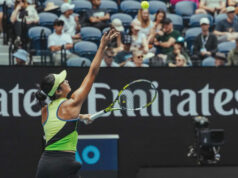There was a time when press conferences featuring Tiger Woods yielded nothing by way of information. He was being reticent by design, to be sure. He didn’t want those on the outside looking in to know more about his private life, and, just as importantly, his peers from getting a better grasp of how he went about his business on the course. As far as he was concerned, winning wasn’t everything; it was the only thing. And for a long, long while, his steely demeanor served to underscore his dominance and singular stature; he was on a pedestal by his lonesome, with all and sundry looking up from a distance — exactly the way he wanted things to be.
That time is long gone, and happily, even for Woods. His kinder, gentler self was on display when he met with members of the media two days before the start of competition at Royal Portrush, and if anything seemed out of the ordinary, it showed in the candor with which he patiently addressed query after query. At Carnoustie last year, he found himself in contention for the Claret Jug, and he revealed that his extremely positive British Open experience fueled his belief that, for all his physical travails, he could win again in golf’s grandest stages. And he did at the Masters in April.
Certainly, Woods continues to enter tournaments with an unwavering commitment to prevail. It’s his approach that has changed, and dramatically. He no longer prepares with a focus bordering on obsession; rather, he does so with a keener understanding of the limitations brought upon him by his advancing age and increasingly brittle body. Meanwhile, he sports the confidence of a 15-time major champion every time he tees off, backstopped by the knowledge that he remains without peer when it comes to mental fortitude.
When Woods begins his campaign for a fourth British Open victory today, he will not be the favorite. It isn’t simply that he knows little of and about Royal Portrush. It’s that, as he acknowledged, his game is “not quite as sharp as I’d like to have it right now.” Much of his perceived handicap stems from his relative lack of in-event reps due to new realities, family pursuits included; after he played at the United States Open, for instance, he saw fit to go on a two-week vacation in Thailand with loved ones. And he hasn’t wielded a club in competition since then. In this light, “not quite as sharp” may well be an understatement.
At this point, Woods is compelled to take the long view. “I want to play here as long as I possibly can,” he noted. “And, you have to understand, if I play a lot, I won’t be out here that long.” Which is why he’s content to walk the tightrope, accepting the fact that, under the circumstances, getting ready simply means not taxing himself and, when he needs to hit the ball on a certain lie in a certain way, trusting that he will always have the imagination and skill set to do so.
Anthony L. Cuaycong has been writing Courtside since BusinessWorld introduced a Sports section in 1994. He is a consultant on strategic planning, operations and Human Resources management, corporate communications, and business development.



